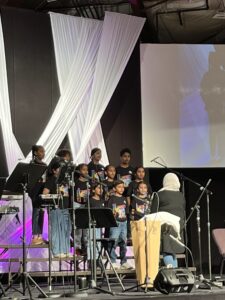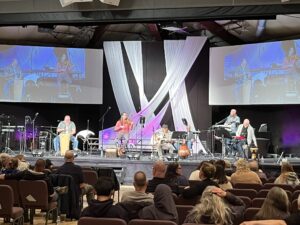by: Dr. Joel Rainey
Pastor, Covenant Church, Shepherdstown, WV
Shepherdstown West Virginia is, as I tell our people often at Covenant Church, a small place connected to a big place. Our church is located in a small town of fewer than 2500 people, but both our history and geographic location connect us with the metro Washington DC area and the world. We stress often at Covenant that God has connected us with these places for a reason—to love that world.
Recently, our Jewish and Muslim neighbors joined us for a night of musical celebration. Our friends at Adas Israel Synagogue in northwest DC, and at ADAMS Center in Dulles, Virginia, have been working with us for many years now on the common concern of opioid addiction. Through that friendship, we discovered something our diverse faith communities have in common—incredible musical talent! We first shared that talent back in the spring of 2022 at Adas Israel Synagogue. This year, that single event has blossomed into three, and we were honored to host the first one.
 Most people would likely believe an event involving Jews and Muslims playing on stage at a conservative West Virginia Evangelical church to be unthinkable. More unthinkable still might be that our Jewish friends know how to play Appalachian music with excellence. But they do! Their rendition of 1970s Stevie Wonder wasn’t bad either! Additionally, all of us got to hear the children’s choir, ADAMS Beat, a group with talent that meets the Kennedy Center standards.
Most people would likely believe an event involving Jews and Muslims playing on stage at a conservative West Virginia Evangelical church to be unthinkable. More unthinkable still might be that our Jewish friends know how to play Appalachian music with excellence. But they do! Their rendition of 1970s Stevie Wonder wasn’t bad either! Additionally, all of us got to hear the children’s choir, ADAMS Beat, a group with talent that meets the Kennedy Center standards.
As for our own artists, the repertoire included everything from 1970s cover songs of the Youngbloods to 1980s Cindy Lauper to a modern Lauren Daigle piece. But the best part of the evening came with the last three songs, in which all three groups took the stage to join their talents, culminating in a way appropriate for any musical event held in this state—the West Virginia state song, “Country Roads.”
The evening ended with a meal and more than an hour of getting to know one another better. The impression I received from our friends who came up from Washington was that they thoroughly enjoyed themselves, and know they have a place they can call “home” whenever they come to our area. That’s certainly my hope. Our own people also learned quite a bit from this experience. Multi-faith work carries some particular challenges for evangelical Christians because we are rightly concerned that we don’t compromise our faith. But before the evening had ended, our church family learned that genuine friendships with people who follow other religions are not at all exclusive from both living and openly sharing our faith in Jesus. Our church would never have learned such a lesson without the “live laboratory” our Jewish and Muslim friends helped us create on March 19.
 The journey continues this month, as our people visit Adas Synagogue for an Iftar Meal they will host for our Muslim neighbors. This is one of those rare years in which the Muslim holy month of Ramadan coincides with both the Jewish Passover and Easter, the Christian celebration of Jesus’ resurrection from the dead. So we are excited to experience the full observance of our Jewish and Muslim friends’ faith practice. And no one knows how to break a fast like Muslims! The food is outstanding!
The journey continues this month, as our people visit Adas Synagogue for an Iftar Meal they will host for our Muslim neighbors. This is one of those rare years in which the Muslim holy month of Ramadan coincides with both the Jewish Passover and Easter, the Christian celebration of Jesus’ resurrection from the dead. So we are excited to experience the full observance of our Jewish and Muslim friends’ faith practice. And no one knows how to break a fast like Muslims! The food is outstanding!
This year, all of this began around a common love for music. Music has a wonderful ability to maintain our distinctions in a way that honors the uniqueness of our beliefs, while simultaneously tearing down every other wall between people. We witnessed this truth powerfully on March 19, and we look forward to more and greater opportunities to build stronger relationships with our friends.
Someone once defined conflict as “two or more people seeking to occupy the same space, at the same time.” That definition is an accurate description of the world we now inhabit. The rapid advance in both communications and global travel, combined with historically unprecedented global migration patterns means that everyone now lives everywhere. For folks like the people in our church who believe God became a man, and calls us to life and faith that is equally incarnational, we should see this moment as one of the greatest opportunities in the last 2000 years to obey Jesus.
On a recent Sunday night, people representing vastly different beliefs came together in West Virginia and proved we can indeed occupy the same space at the same time—without conflict. I’m grateful to our neighbors for taking this risk so we can genuinely love them as we believe Jesus does.